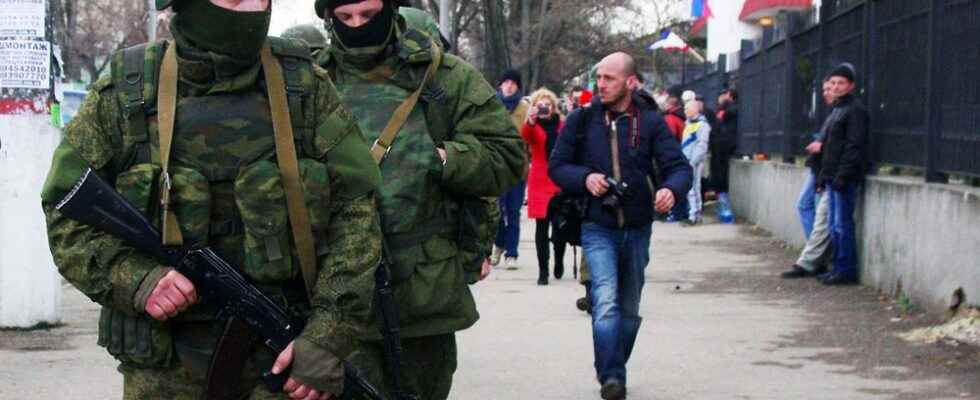Since Tuesday, February 15, Vladimir Putin claims to have begun the withdrawal of Russian troops massed near the Ukrainian border, raising fears of an invasion. At the same time, NATO says deployments are continuing. The American president, Joe Biden, thus declared that the Russian soldiers present in the region would henceforth be “more than 150,000”, specifying that “his feeling” was that an attack would occur “in the coming days”.
Western mistrust is all the greater because Moscow has made military deception its trademark. Admittedly, such tricks are as old as the world, like the Trojan horse mentioned in The Odyssey of Homer. But in Russia, this approach has a specific name: the “maskirovka“, which can literally be translated as “camouflage”. And she has been teaching herself in her military academies for decades.
This doctrine pushes cynicism to its limit: never admitting one’s true intentions, and resorting to all possible political and military means to deceive the enemy and keep the initiative. “Russian instructors insist a lot on this tool, on the importance of concealment and surprise in war,” says Gustav Gressel, Russia specialist at the European Council on International Relations. maskirovka is all the more systematic in that the Russian authorities – and the Soviet authorities before them – do not have to render an account to the public.” A major difference with the United States, which had used the presence of weapons of mass destruction as a pretext to invade Iraq in 2003 – a lie.
Putin’s “Little Green Men”
The annexation of Crimea by the Kremlin in 2014 is considered a textbook case of maskirovka. This Ukrainian territory, where one of the largest bases of the Russian navy, Sevastopol, is located, was attacked on February 28, 2014 by hooded soldiers without insignia, who appeared out of nowhere – the famous “little green men”.
“Vladimir Putin initially denied that they were Russians, recalls Gustav Gressel. Before giving them medals a few weeks later and admitting that they were indeed Russian troops, in the occurrence of special forces, deployed in Crimea just after their participation in the protection of the Winter Olympics in Sochi [NDLR : qui s’étaient tenus du 7 au 23 février 2014].”
Suspected Russian soldiers patrol a street in Simferopol, Crimea, March 5, 2014.
afp.com/Alexey Kravtsov
The creation of incidents serving as a pretext for military intervention is also part of the panoply of maskirovka Russian. Washington has been denouncing, for several days, a “scenario” of provocations in the Donbass, which would serve as an excuse for Moscow’s military intervention. The secessionist territories, where Russian passports have been distributed free of charge in recent years, thus announced on Friday February 18 the evacuation of civilians to neighboring Russia, in anticipation of a Ukrainian invasion. However, Kiev repeated, the same morning, that it had “no intention of carrying out any offensive”.
This framework recalls the precedent of Georgia, in 2008. After days of exchanges of fire between the local forces and those of the separatist region of South Ossetia, Moscow had taken the pretext of attacks against the Russian peacekeepers and the South Ossetian residents of Russian nationality to launch a rapid and devastating offensive. Tbilisi, which claimed at the time to be able to join NATO, like Ukraine today, had to accept a ceasefire. And to renounce, de facto, to regain control of the self-proclaimed republics of Abkhazia and South Ossetia, where the Kremlin has established military bases.
Russian soldiers on maneuvers on August 13, 2008, in the separatist region of Abkhazia, Georgia.
afp.com/VIKTOR DRACHEV
“All the operations incorporated deception”
The Soviet era is not to be outdone when it comes to resorting to maskirovka. Against the Nazi army, during the Second World War, Stalin’s generals resorted to trickery as much as to the effect of numbers. “All operations included a part of deception. This was the case during Operation Bagration, in the summer of 1944, when the Russian army confused the Germans and scattered their forces with momentary attacks”, recalls the historian Lasha Otkhmezuri, author, with Jean Lopez, of a biography on one of the main actors of this victory, Marshal Joukov, published by Perrin.
Disinformation is not just about troop movements. In 2014, to hide its clandestine intervention in the Donbass, Russia did not hesitate to set up a humanitarian convoy of more than 250 hastily painted white trucks, which left Moscow on August 12. For several days, the media focused on this event, reported on television, while Russian soldiers “on vacation” and weapons, sometimes sophisticated, crossed the border elsewhere.
Women watch the trucks of the humanitarian convoy sent by Moscow at the Izvarino border crossing between Russia and Ukraine on August 22, 2014.
afp.com/Sergey Venyavsky
Less than a month earlier, on July 17, Malaysia Airlines flight MH17, connecting Amsterdam to Kuala Lumpur, was shot down by a surface-to-air missile, killing 298. An international team of investigators concluded that it could only have been supplied by the Russian military. But Moscow has always denied its involvement. Since it has always refused to recognize its military support for the pro-Russian separatists, faithful to the precepts of maskirovka.
Clement Daniez
